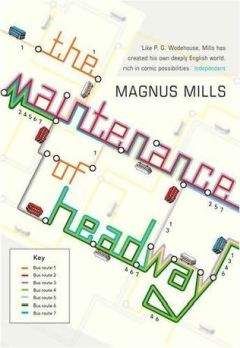Magnus Mills - The Maintenance of Headway

Обзор книги Magnus Mills - The Maintenance of Headway
Magnus Mills
The Maintenance of Headway
One
“There’s no excuse for being early,” said Breslin.
“No, I suppose not.”
“None whatsoever.”
“No.”
“It is forbidden.”
“Yes.”
He looked at his watch, studying it intently for several long moments before returning his gaze to me.
“So now we’re both agreed there’s no excuse for being early,” he said. “Why are you early?”
“I just am,” I replied. “Sorry.”
“You’re sorry.”
“Yes.”
“You’re sorry. I’m sorry. Everybody’s sorry. Well, sorry just isn’t good enough. Sorry doesn’t stop you from being early, does it?”
I said nothing. There was no point. Breslin was quite correct. There was no excuse for being early. He gave a sigh and shook his head. “You’ll just have to stay here for a minute or two.”
And so I remained there, suspended in time, with Breslin peering at his watch every now and again, while my people sat in silence behind me. Two full minutes ticked by and nobody stirred. Then at last he let me go.
“Slow down a little, will you?” was his parting remark.
As Breslin’s motionless figure receded in my mirror I wondered how often he’d been through this performance during his long career. He certainly made it look convincing, especially his pointed observance of his wristwatch. For me it was a rare encounter. He’d only pulled me up once previously for being early, about a year before; but there were others, of course, who’d undergone the ritual on countless occasions. Which made Breslin very well practised in his profession. It was his job, above all else, to prevent us from being early, and he was a master of it. You never knew when or where he was liable to appear, though some of us with a bit more experience could usually read the signs. His presence was most likely on fine days when the rain didn’t threaten to drive him indoors. We could also expect to see him when word had gone around that increased pressure was being exerted from higher up the chain of command. Periodically we’d let each other know if he had been spotted hovering at a particular location. This could be anywhere between the cross and the southern outpost, but he was known to favour some places more than others. Then again he might leave a trail of deliberate clues. If, for example, he was standing on the far side of the road when you went up, and he ignored you, it meant you had to be extra careful coming back down again, when undoubtedly he wouldn’t. You needed to bear in mind that Breslin was always somewhere, and if it wasn’t him it was one of his ilk.
What had happened just now was due to a lapse on my part. Breslin and the other officials had been keeping a low profile for almost a week, and this had lulled me into a false sense of security. Day after day at this point, at this time, I had been early. And so had my leader, and so had his leader before him, a trend that repeated itself right up the line. Then suddenly, for reasons of his own, Breslin had decided to strike. Doubtless there were far worse cases than mine. After all, I was only six minutes early. There were certain individuals who could easily have been ten minutes early during a quiet spell like this, and they wouldn’t have been treated quite so leniently. Breslin knew my face, however, and he’d let me off the hook.
Nonetheless, I resumed my journey feeling somewhat disgruntled. By detaining me for two minutes, Breslin had completely disrupted my momentum. I’d been drifting across the common on a bright spring morning, speculating about my breakfast, knowing I had six minutes in hand. Six minutes to do with as I wished. Six minutes that spared me from having to rush. Six minutes that allowed me to be patient with my people; even to be nice to them. But now Breslin had interfered and two of those minutes were lost forever. Admittedly, I still had four minutes to spare, yet somehow it wasn’t the same.
When I got back I discussed the matter with Edward, who could be relied upon to have an empathetic ear.
“I know the feeling well,” he said. “You’re coming in for breakfast, counting down towards your change over. You’ve allowed for unforeseen events unfolding in the final mile. You’ve got it all planned. You’re going to get rid of a minute here, a minute there, all nicely under your personal control. Then suddenly it’s snatched away from you. You’ve lost your freedom of action.”
“Precisely.”
“I agree it can be very irksome,” said Edward. “Unfortunately, it’s an occupational hazard. You must understand that there are contradictory forces at work in this industry. If we’re late the people don’t like it. If we’re early the officials don’t like it. And if we’re on time we don’t like it. The truth is, our desires run counter to received opinion and we simply have to accept that as a fact.”
“But when I first started I was quite content to be on time.”
“So was I,” he said. “For a while. But the longer you’re here the greater the tendency to be early. It’s perfectly natural.”
“Is it?”
“Of course. There are many others just like yourself. Those who take an interest, that is.”
“Not the worker ants then?”
“No, not them,” said Edward. “They have little imagination. No flair for the job, so to speak. They just go back and forth, blissfully unaware of the game that’s being played all around them.”
“Is that what it is then?” I asked. “Just a game?”
“Just a game,” Edward answered. “Just a game.” He glanced at his watch, stood up and walked away from the table, leaving me alone to ponder his words. It occurred to me that it would have suited the Board of Transport very well if all their employees were indeed worker ants, as Edward called them. Homogenous automatons would be even better. But actually we were a mixed bunch and we all operated at different speeds. Some of us were quick; some of us were slow; some of us, like me and Edward, could be either, according to circumstances. Yet we had discovered over the years that we functioned at our best if we were allowed to be early. For my part, when I was early it felt like I was floating in the fourth dimension, which in a sense I was. Being early could make the whole day pass more smoothly. It created an agreeable state of mind.
And being late, of course, was quite unthinkable. “Is that your bus out there?” said a voice. Davy had joined me.
“No,” I replied. “I’m not due back until twelve minutes past.”
“Well, she’s sitting out there full of people,” he said. “Somebody had better get a move on.”
“Maybe it’s Edward’s. He’s just gone downstairs.”
“No, he’s southbound.”
“Definitely not mine,” I said. “Not guilty.”
Davy sat down. “Got much to do?” he asked.
“No,” I said. “Up the cross. Back here. Finish.”
“Very nice.”
“How about you?”
“Loads left yet. Eleven-hour spread-over.”
“Well, be careful round by the common. Breslin’s on the prowl.”
“I’m fully aware of that, thank you. He’s just booked me.”
“You’re joking.”
“I’m not.”
“What for?”
“Rule twenty-two,” said Davy. “Breach of.”
“That’s odd,” I said. “I went through the common six minutes early and he let me off with a light grilling.”
Davy smiled. “I was six early as well. Only trouble was, my leader happened to be ten late.”
“So you both arrived together.”
“Correct.”
“Oh, they don’t like that.”
“Tell me about it.” Davy went and got some tea and ordered his breakfast.
“How could your leader be ten minutes late on a day like this?” I asked, when he came back. “It’s as quiet as anything.”
“Because my leader was Mrs Barker.”
“Not her again,” I said. “Flipping heck, she’s a nuisance.”
“Yeah.”
“Not to worry, though. Breslin might never get round to filing his report, if you’re lucky.”
“Maybe not,” said Davy. “I noticed he was writing my details in pencil, not biro.”
“There you go then.”
We drank our tea.
“By the way,” he said. “Changing the subject slightly, do you want to swap holidays this year?”
“Why, where are you going?” I asked.
“The seaside probably,” he replied. “What’s that got to do with it?”
“Well, if I’m swapping holidays I want to know where I’m going to spend them, don’t I?”
“I don’t mean swap places,” he snapped. “I mean swap dates. I’ve got spring; you’ve got autumn. Do you want to swap or not?”
“Yes, alright.”
“Thought so,” he announced, producing a docket. “I’ve already filled in the relevant details.”
The docket was pre-signed by Davy, so all I had to do was add my own signature and the transaction was complete. He then pulled out a whole wad of similar dockets and began leafing through them.
“I’ve got one or two job swaps here as well,” he said. “Might interest you. Let’s have a look.”
Davy habitually carried a number of these exchange dockets with him. There were forty rostered duties on our route, covering almost twenty-two hours each day. Different drivers had different preferences about which hours they worked, and therefore a great deal of swapping took place. Some favoured those duties which were spread over a longer period of time, and which as a result paid higher wages. Others liked to work in the late evenings, which left them the daylight hours to pursue other pastimes. My personal predilection was for dawn starts, but these types of duty were rare and you couldn’t always get them. Which was when it was best to speak to Davy. He acted as a sort of broker between drivers, arranging two- and even three-way swaps on their behalf. Officially there was a clerk downstairs in the duty room who was supposed to handle this kind of thing, but most of us found it easier to use Davy’s services. Whenever I was looking for a dawn start he invariably had a suitable one hidden up his sleeve.
“Here you are,” he said. “Two weeks’ time. Number three duty.”
“Great,” I said.
“Right. Sign here.”
At that moment the canteen door swung open and Hastings burst in looking very red-faced.
“Whose bus is that out there full of people?” he demanded.
There were about a dozen drivers sitting round the various tables. Nobody answered. Hastings stormed out again.
“Six weeks’ time you’ve got a spread-over,” Davy continued.
“Have I?” I said.
“I’ll take that and then fix it for you to do Fitzroy’s job. OK?”
“Sounds fine to me.”
“So you need to sign this. And this.”
I did as he asked. “Anything else?” I enquired.
“Not for the moment, no,” said Davy.
Again the door swung open and Hastings reappeared.
“Look,” he said. “It must be one of you lot. I’ve been round the whole garage and there are no other drivers about. That bus has been waiting almost ten minutes and the people are on the verge of rebellion. It won’t be long before they turn into a baying mob.”
Hastings looked desperate, so I said, “Why don’t you try that bloke over there?”
In the far corner of the canteen was a rest area equipped with a television set and a few soft, low chairs. The TV was never switched off and had been stuck on the same channel for at least four years. It was strategically mounted on a shelf directly opposite the west window, so on summer evenings, as the rays of the setting sun beat in through the glass, the television screen was completely obliterated.
Slumped on one of the low chairs was a driver, fast asleep. I happened to know he was a recent recruit, and clearly he was not yet accustomed to the regime. Hastings marched over to him and there followed an unfortunate scene in which the poor fellow was woken unceremoniously from his slumbers. Then, still in a dazed state, he was ordered downstairs to take over the stranded bus. I was glad it wasn’t me.
Davy and I finished off our business with the dockets. I checked my watch. Fifteen minutes remaining. Just time for another tea.
“Look,” said Davy. “There goes Mick.”
I glanced across the canteen. Mick Wilson had just come in and was heading towards the officials’ annexe, accompanied by two inspectors. They were both in full uniform and walked one on each side of him. We gave Mick a wave, and he nodded in reply. Then he was gone.
“I wonder how long it’ll be before he undergoes his conversion?” I said.
“Same as the others, I expect,” said Davy. “Virtually instantaneous.”
“I’d have thought Mick would hold out for at least a short while,” I said. “After all, he’s an archetypal early man.”
“That doesn’t seem to make any difference,” replied Davy. “Look at the way Barrington was transformed in a matter of only a few days.”
“Oh, yes, Barrington,” I said. “I’d forgotten all about him.”
“Exactly,” said Davy. “He used to be very much one of us, yet he accepted the entire doctrine in a twinkling. No questions asked. Needless to say it did him no good at all. Two years, he lasted, before vanishing into obscurity.”
“Friendless and forgotten.”
“Indeed.”
“I hope that doesn’t happen to Mick,” I said.
“Well, it might,” Davy answered.
Two
“There’s no excuse for being early,” said Breslin.
“No, I suppose not.”
“None whatsoever.”
“No.”
“It is forbidden.”
“Yes.”
This was the second time in a week Breslin had pulled me up for being early, and he would have been well within his rights to throw the book at me. He was quite correct, of course. There was no excuse for being early. Today, however, there was at least a reason. During the morning a water main had burst on the approach road south of the river, and the ensuing emergency repairs had blocked the route to the common. A diversion was put in operation which sent all our buses along the embankment. It so happened the repair work had been completed just as I came over the bridge. The diversion was therefore lifted and I continued along the normal route. Now generally on these occasions the first bus to arrive after a long interval gets clobbered with people, and there were indeed a lot of them waiting at the stops. By some fortune, though, the ones who came onto my bus were what I called a ‘good sample’. This was my term for people who didn’t dawdle when they came on board. They knew where they were going, they had the correct fares ready beforehand, and they didn’t waste time bewailing the lack of buses. They were on their way to work, mostly, all heading for the same destination, namely the underground station at the far side of the common, and it was in none of their interests to delay the bus. Once I’d served the first few stops I was packed to the gunwales, so I put my foot down and pressed on, my priority being to get these people on their way as quickly as possible. It wasn’t until I neared the edge of the common and saw Breslin standing there that I bothered to check the time. I was six minutes early. He flagged me down and I stopped.




